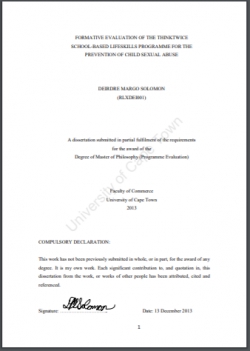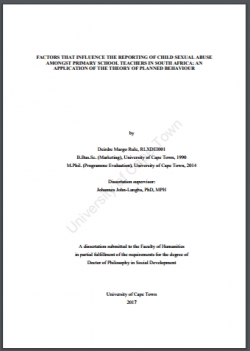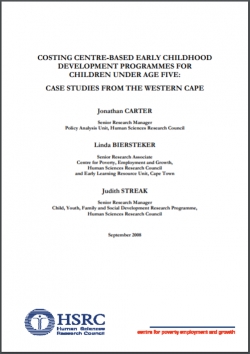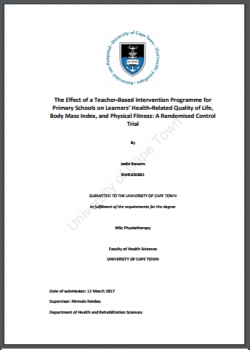Formative evaluation of the Thinktwice school-based lifeskills programme for the prevention of child sexual abuse

Type
Thesis
Authors
Category
ECCE, Foundation
[ Browse Items ]
Publication Year
2014
Publisher
URL
[ private ]
Pages
81 p.
Subject
Early childhood care and education (ECCE), Preschool education, Young children, Sexual abuse, Care, Interventions, Jerry Giraffe programme, Implementation, Evaluation, South Africa
Tags
Abstract
The Jerry Giraffe programme is a school-based child sexual abuse prevention programme developed by ThinkTwice, a non profit organisation. Operating from offices in Cape Town, ThinkTwice exists to meet this need to provide improved care and protection to children. Through the Jerry Giraffe programme, ThinkTwice trains teachers of children aged four to six years old in crèches and preschools to deliver the Jerry Giraffe programme to these children. The main aims of the Jerry Giraffe programme is to equip children and their teachers with skills and knowledge so that more disclosures of child sexual abuse by children will bring about a reduction of this crime against children, as more perpetrators are brought into the light and face penalties for these crimes. If teachers are trained in child sexual abuse dynamics and the signs and symptoms of child sexual abuse, and if children are taught to disclose when they are being abused, then teachers will be able to follow the child protective protocols at their crèches and preschools and will fulfil their mandatory reporting role as demanded by law in South Africa.
A formative evaluation was conducted to assess whether the Jerry Giraffe programme is implemented as intended and whether ThinkTwice’s expected outcomes were realised in the trained teachers as a result of the training received by them from ThinkTwice. In addition, a literature review was conducted to investigate whether the programme theory as articulated by ThinkTwice was plausible. A review of the programme records was undertaken and a telephonic survey was administered 6 to a sample of teachers trained by ThinkTwice between January 2012 and June 2013 to assess their perceptions of the training they received, as well as their own actions, following the training in terms of protective actions they had implemented with the children in their care.
The results of the current evaluation indicated that ThinkTwice trainers have implemented the teacher training component of the Jerry Giraffe programme as intended but that there has been a relatively slow uptake of the programme in 2013. Teachers reported improved confidence in their abilities to identity and report cases of suspected child sexual abuse and the majority had implemented the Jerry Giraffe programme with the children in their care. The results also indicated that teachers favourably perceive the training they received from ThinkTwice and would recommend that more teachers attend these trainings. Despite this, there are still deeply-ingrained perceptions that child sexual abuse is mainly perpetrated by strangers, that it is not common amongst young children and that reporting cases brings about more harm than good. It will take a concerted effort by ThinkTwice and other stakeholders such as the child protective services and justice system in South Africa to reverse these misconceptions.
Recommendations for improving the Jerry Giraffe programme, as well as areas of further research, are provided. The existing intervention needs to evolve and take into account new technology-related child sexual abuse. And, if there is to be any extension of the Jerry Giraffe programme to other provinces in South Africa, this must be accompanied by robust randomised controlled trials.
A formative evaluation was conducted to assess whether the Jerry Giraffe programme is implemented as intended and whether ThinkTwice’s expected outcomes were realised in the trained teachers as a result of the training received by them from ThinkTwice. In addition, a literature review was conducted to investigate whether the programme theory as articulated by ThinkTwice was plausible. A review of the programme records was undertaken and a telephonic survey was administered 6 to a sample of teachers trained by ThinkTwice between January 2012 and June 2013 to assess their perceptions of the training they received, as well as their own actions, following the training in terms of protective actions they had implemented with the children in their care.
The results of the current evaluation indicated that ThinkTwice trainers have implemented the teacher training component of the Jerry Giraffe programme as intended but that there has been a relatively slow uptake of the programme in 2013. Teachers reported improved confidence in their abilities to identity and report cases of suspected child sexual abuse and the majority had implemented the Jerry Giraffe programme with the children in their care. The results also indicated that teachers favourably perceive the training they received from ThinkTwice and would recommend that more teachers attend these trainings. Despite this, there are still deeply-ingrained perceptions that child sexual abuse is mainly perpetrated by strangers, that it is not common amongst young children and that reporting cases brings about more harm than good. It will take a concerted effort by ThinkTwice and other stakeholders such as the child protective services and justice system in South Africa to reverse these misconceptions.
Recommendations for improving the Jerry Giraffe programme, as well as areas of further research, are provided. The existing intervention needs to evolve and take into account new technology-related child sexual abuse. And, if there is to be any extension of the Jerry Giraffe programme to other provinces in South Africa, this must be accompanied by robust randomised controlled trials.
Description
Thesis (MPhil)--University of Cape Town, 2014
Number of Copies
1
| Library | Accession No | Call No | Copy No | Edition | Location | Availability |
|---|---|---|---|---|---|---|
| Main | 812 | 1 | Yes |



